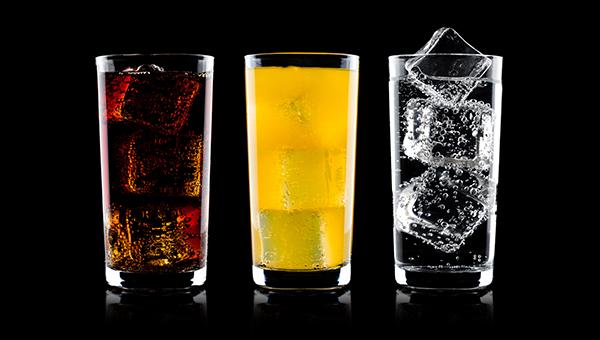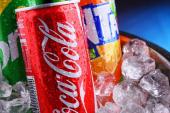Diet Drinks May Help With Weight Loss and Cardiometabolic Control
Switching from sugary drinks to artificially sweetened ones may have some benefits, but it’s not a health-promoting strategy, an expert says.

Substituting no- or low-calorie drinks for sugar-sweetened ones may help people lose weight and control cardiometabolic risk factors as effectively as if they switched to drinking water, a systematic review and meta-analysis suggest.
Although recommendations from many health and medical organizations strictly consider water to be the standard substitute for sugar-sweetened beverages, the study authors say the literature supports the conclusion that low- and no-calorie drinks like diet colas and carbonated, flavored waters aid in decreasing body mass index (BMI), body fat, and intrahepatocellular lipids (IHCLs) over the moderate term in people who are overweight and have diabetes or are at risk for it.
The conclusions also support the findings of the American Heart Association’s 2018 science advisory, which waffled on its recommendations, saying that while water is best, low-calorie beverages are an acceptable substitute in adults who are habitual consumers of sugary drinks.
The study authors, led by Néma D. McGlynn, MSc, RD (University of Toronto, Canada), say the findings are particularly important given that studies suggest people who are successful at maintaining weight loss consume diet drinks and report that they help in controlling caloric intake and keeping off lost pounds.
Just because something is considered less bad doesn’t mean it’s good for you. Andrew Freeman
Commenting on the findings for TCTMD, Andrew Freeman, MD (National Jewish Health, Denver, CO), noted that while there is no doubt that sugary drinks are bad for health, a recent French population-based study found no difference in risk of developing CV disease between people drinking diet or sugary drinks.
“Just because something is considered less bad doesn’t mean it’s good for you,” Freeman said. “For the drinks that are artificially sweetened, we know that some [of these sweeteners] carry risks that we're not even entirely sure of . . . and grouping them all together in a relatively nonhomogenous bunch as they did in this study, doesn’t tell us much. At the end of the day, the advice for human beings isn't that we should switch from one harmful thing to one that's less harmful, but rather to one that's health-promoting.”
Small Reductions Seen
The meta-analysis, published in JAMA Network Open, included 17 RCTs involving 1,733 adults (mean age 33.1 years; 77% women) who were overweight or obese and at risk for, or diagnosed with, type 2 diabetes. The trials included a variety of artificial sweeteners, including aspartame, acesulfame potassium blend, saccharin, rebaudioside A (from stevia leaves), and sucralose. In some cases, the sweetener used was not identified. Trials varied in design and in comparator, substituting low- or no-sugar drinks for sweetened drinks in 12 RCTs, water for sugar-sweetened drinks in three RCTs, and low- or no-sugar drinks for water in nine RCTs.
For the primary outcome of body weight, people who drank low- or no-calorie drinks lost an average of 1.06 kg more than those who drank sugary drinks or water. They also had lower BMI (-0.32; 95% CI -0.58 to -0.07), percentage of body fat (-0.60%; 95% CI -1.03% to -0.18%), and IHCL (-0.42; 95% CI −0.70 to -0.14) compared with the sugary drinks/water group. However, no differences were seen in other outcomes such as glycemic control, blood pressure, uric acid, and aspects of lipid profile. In all of these, the pooled effect estimates favored water. When low- or no-calorie drinks were used as a substitute for water, the only major difference were greater decreases in HbA1c with water and in systolic BP with diet drinks.
“The observed improvements in downstream, intermediate cardiometabolic outcomes are also in agreement with findings of previous systematic reviews and meta-analyses,” McGlynn and colleagues write. “The findings of this study can inform guidance on the role of [diet drinks] in sugar-reduction strategies.”
As for Freeman, he said the meta-analysis does not change his advice to patients. “We have to do our best to make sure the public health message is clear,” he said. “Unsweetened tea or unsweetened water is still the way to go.”
L.A. McKeown is a Senior Medical Journalist for TCTMD, the Section Editor of CV Team Forum, and Senior Medical…
Read Full BioSources
McGlynn ND, Ahmad Khan T, Wang L, et al. Association of low- and no-calorie sweetened beverages as a replacement for sugar-sweetened beverages with bodyweight and cardiometabolic risk: a systematic review and meta-analysis. JAMA Network Open. 2022;5(3):e222092.
Disclosures
- McGlynn reports receiving a Canadian Institutes of Health Research (CIHR)-Masters Award during the conduct of the study and being a former employee of Loblaws Companies Limited outside the submitted work.
- Freeman reports no relevant conflicts of interest.




Comments